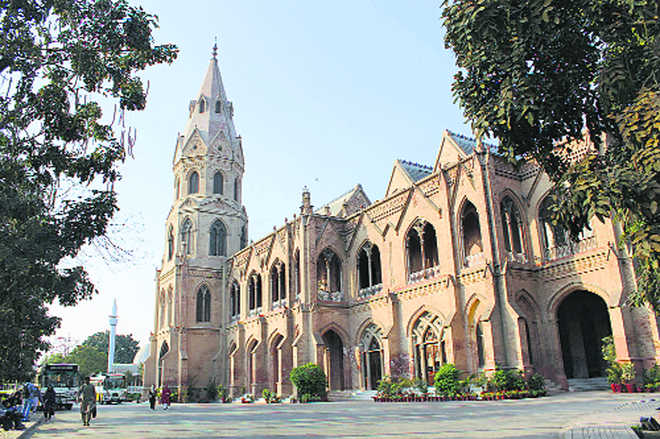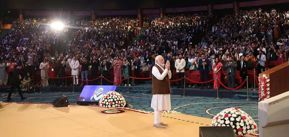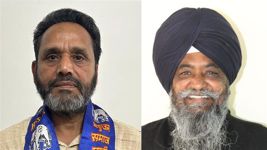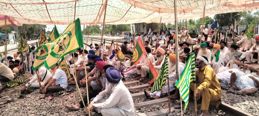
Restoring a legacy: A view of the 150-year-old building of Government College University, Lahore
Rajesh Kochhar
This memoir by Dr Khalid Aftab is about the 150-year–old Government College, Lahore, and its transformation into a university. Dr Aftab’s unique relationship with the institution — as a student, teacher, Principal and the founder Vice-Chancellor of Government College University, as the new institution was named, gives him a ring-side view of the journey and the trials that led to the making of an enviable establishment.
It was due to his sustained efforts that the college was made into a full-fledged university. His association of almost two decades with the institution has taken the shape of a personalised memoir describing how discipline was enforced against all odds, and academic standards were raised.
Established in January 1864, the college remained a bastion of high-quality liberal English education throughout the colonial period. The two Punjabis, Har Gobind Khorana and Abdus Salam, Nobel laureates in science, were former students, as were Faiz Ahmad Faiz (poet), Khushwant Singh (writer) and Dev Anand.
Because of the post-colonial socio-political changes, it became impossible for the college to maintain its earlier elitist culture. “The events that unfolded on the campus in the 1980s were worse than at any time in the past”. Cronyism replaced merit, indiscipline spread; many professors started focusing on private tuitions, neglecting teaching in the college.
Finally, in November 1993, Dr Khalid Aftab, then the head of the college’s economics department, was called by Prime Minister Nawaz Sharif for a meeting. It turned out to be a watershed in the history of the college. The meeting was attended among others by the Mayor of Lahore who was a close political associate of the Prime Minister. The mayor’s son, studying in the college, was a student leader who had the backing of many political leaders.
The Prime Minister asked Dr Aftab to take charge of the college and stem the rot. The principal-designate boldly pointed towards the mayor and mentioned his son.
There were many such bold gestures by the new Principal to salvage the remains of the former glory of the institution and to instil discipline among students and staff. Some students, involved in firing on the campus, were expelled despite political pressure. The superintendent of the girls’ hostel, appointed on ‘directions from the Prime Minister’s wife’, was dismissed on account of insubordination.
Not just a disciplined environment, Dr Aftab wanted to provide to worthy role models to the students to emulate. One such approach was to acquaint the present students with praiseworthy trailblazers from the past. An old hall was renamed Abdus Salam Hall to honour the great scientist’s memory and remind the current generation of a shared space with such greats. Dr Aftab faced many threats for this initiative, as Pakistan was reluctant to own Salam because he was an Ahmadiya, a sect declared non-Muslim in 1974.
Confrontations were easier to handle than subversions and Dr Aftab faced many during his time at GCU. On being given degree-awarding status in 1997, the college revised the BA English syllabus and brought out a book to teach it. Authors of guide books, the Urdu Bazar publishers and book sellers launched a campaign against the new English curriculum. A privilege motion was tabled in the Punjab Assembly alleging that the new curriculum was anti-Islamic. The matter, however, was settled on the intervention of the Education Minister.
Dr Aftab shares another interesting anecdote. The university’s undergraduate curriculum on Islamic Studies was denounced as un-Islamic in the Friday sermon in many mosques. The situation was serious enough for ISI to investigate. The new curriculum demanded extensive reading in subjects like philosophy of Islam as well as articles in English. While the students and most of the faculty were happy with the curriculum, a handful of teachers felt unequal to the task. Finally, the rabble-rouser was identified as a teacher who doubled as an imam. The problem was solved by repatriating erring teachers to the government education department and hiring younger teachers.
There is another interesting story about plagiarism. An economics professor lifted passages from the Nobel laureate Amartya Sen’s work for a paper for the college journal. He was forced to quit.
Dr Aftab mentions his visit to India in 2006 on invitation from India-based Ravians, as students of Government College are called (after River Ravi). The highpoint of his emotionally charged tour was a brief visit to his birthplace Muktsar.
The book offers a remarkable read not only for those who have been affiliated with the college, but anybody interested in the post-1947 history of educational institutions not only in Pakistan but also elsewhere in the sub-continent.



























